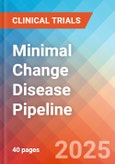Minimal Change Disease Understanding
Minimal Change Disease (MCD): Overview
Minimal-change disease (MCD), also known as lipoid nephrosis or nil disease, arises from a histopathologic lesion in the glomerulus and is characterized by the intense proteinuria leading to edema and intravascular volume depletion. Minimal change disease is a kidney disorder that can lead to nephrotic syndrome. In adults, the disease is usually secondary (it is caused by another disease or drug). In children, MCD is usually primary (or idiopathic, which means the exact cause is not known). The cause is unknown, but the disease may occur after or be related to: Allergic reactions, Use of NSAIDs, Tumors, Viral infections. Signs and symptoms of MCD include: Foamy urine due to large amounts of protein, Weight gain, Edema, High Cholesterol. Although Minimal Change Disease can be suspected from many of its different symptoms, the only way to be certain of the diagnosis is with a biopsy. The treatment for nephrotic syndrome in adults with MCD is usually with a type of drug called a corticosteroid, often called steroids.'Minimal Change Disease - Pipeline Insight, 2025' report outlays comprehensive insights of present scenario and growth prospects across the indication. A detailed picture of the Minimal Change Disease pipeline landscape is provided which includes the disease overview and Minimal Change Disease treatment guidelines. The assessment part of the report embraces, in depth Minimal Change Disease commercial assessment and clinical assessment of the pipeline products under development. In the report, detailed description of the drug is given which includes mechanism of action of the drug, clinical studies, NDA approvals (if any), and product development activities comprising the technology, Minimal Change Disease collaborations, licensing, mergers and acquisition, funding, designations and other product related details.
Report Highlights
The companies and academics are working to assess challenges and seek opportunities that could influence Minimal Change Disease R&D. The therapies under development are focused on novel approaches to treat/improve Minimal Change Disease.Minimal Change Disease Emerging Drugs Chapters
This segment of the Minimal Change Disease report encloses its detailed analysis of various drugs in different stages of clinical development, including phase II, I, preclinical and Discovery. It also helps to understand clinical trial details, expressive pharmacological action, agreements and collaborations, and the latest news and press releases.Minimal Change Disease Emerging Drugs
- GFB-887: Goldfinch Bio
Minimal Change Disease: Therapeutic Assessment
This segment of the report provides insights about the different Minimal Change Disease drugs segregated based on following parameters that define the scope of the report, such as:Major Players in Minimal Change Disease
There are approx. 3+ key companies which are developing the therapies for Minimal Change Disease. The companies which have their Minimal Change Disease drug candidates in the most advanced stage, i.e. phase I include, Goldfinch Bio.Phases
The report covers around 3+ products under different phases of clinical development like
- Late stage products (Phase III)
- Mid-stage products (Phase II)
- Early-stage product (Phase I) along with the details of
- Pre-clinical and Discovery stage candidates
- Discontinued & Inactive candidates
Route of Administration
Minimal Change Disease pipeline report provides the therapeutic assessment of the pipeline drugs by the Route of Administration. Products have been categorized under various ROAs such as- Oral
- Parenteral
- Intravenous
- Subretinal
- Topical.
Molecule Type
Products have been categorized under various Molecule types such as
- Monoclonal Antibody
- Peptides
- Polymer
- Small molecule
- Gene therapy
Product Type
Drugs have been categorized under various product types like Mono, Combination and Mono/Combination.Minimal Change Disease: Pipeline Development Activities
The report provides insights into different therapeutic candidates in phase II, I, preclinical and discovery stage. It also analyses Minimal Change Disease therapeutic drugs key players involved in developing key drugs.Pipeline Development Activities
The report covers the detailed information of collaborations, acquisition and merger, licensing along with a thorough therapeutic assessment of emerging Minimal Change Disease drugs.Minimal Change Disease Report Insights
- Minimal Change Disease Pipeline Analysis
- Therapeutic Assessment
- Unmet Needs
- Impact of Drugs
Minimal Change Disease Report Assessment
- Pipeline Product Profiles
- Therapeutic Assessment
- Pipeline Assessment
- Inactive drugs assessment
- Unmet Needs
Key Questions
Current Treatment Scenario and Emerging Therapies:
- How many companies are developing Minimal Change Disease drugs?
- How many Minimal Change Disease drugs are developed by each company?
- How many emerging drugs are in mid-stage, and late-stage of development for the treatment of Minimal Change Disease?
- What are the key collaborations (Industry-Industry, Industry-Academia), Mergers and acquisitions, licensing activities related to the Minimal Change Disease therapeutics?
- What are the recent trends, drug types and novel technologies developed to overcome the limitation of existing therapies?
- What are the clinical studies going on for Minimal Change Disease and their status?
- What are the key designations that have been granted to the emerging drugs?
Key Players
- Goldfinch Bio
- Bristol-Myers Squibb
Key Products
- Abatacept
- GFB-887
This product will be delivered within 2 business days.
Table of Contents
Companies Mentioned (Partial List)
A selection of companies mentioned in this report includes, but is not limited to:
- ● Goldfinch Bio
- ● Bristol-Myers Squibb








